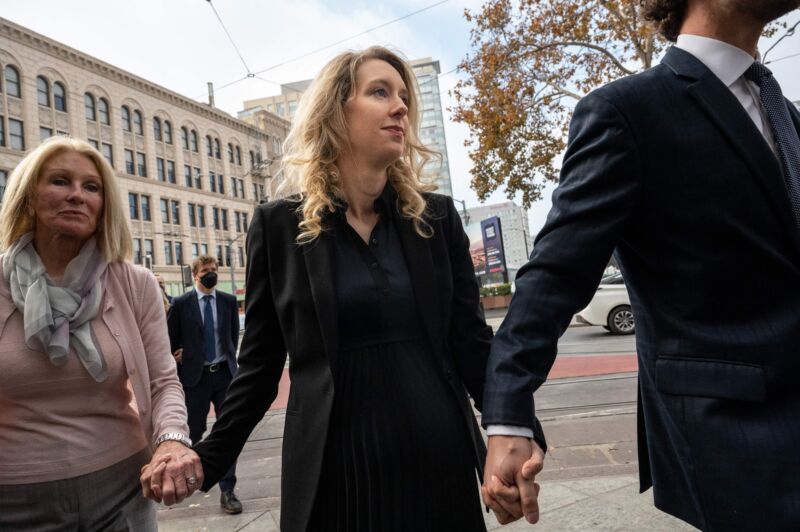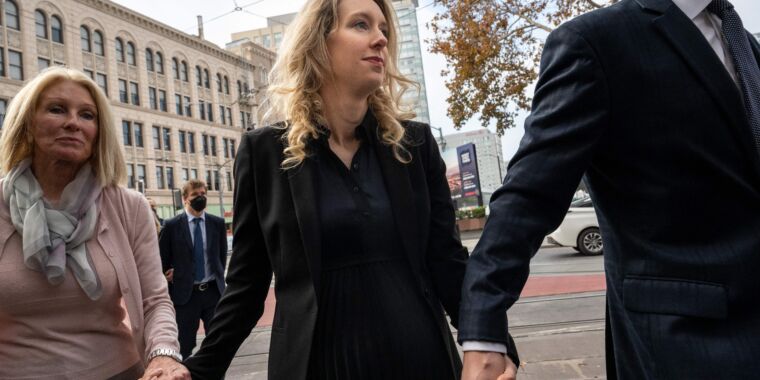
Elizabeth Holmes has been sentenced to 11.25 years in prison, plus three years of supervision for her January conviction for defrauding investors of her failed blood testing company, Theranos. Restitution in the case will be determined at a later hearing, which has not yet been set.
The sentence is less than the 20-year maximum set by federal sentencing guidelines, but still more than the nine-year sentence recommended by the parole officer in Holmes’ case.
Federal prosecutors had demanded 15 years in prison and Holmes, 38, to pay about $804 million in restitution to defrauded investors. Holmes’ lawyers, meanwhile, sought just 18 months of house arrest, arguing that she has “essentially no assets” and could not pay a nine-figure fine.
Judge Edward Davila of the U.S. District Court for the Northern District of California today handed down the jail sentence in San Jose, California, where reporters began to gather outside the courtroom before the 10 a.m. PST start time for sentencing. First in line was Wall Street Journal reporter John Carreyrou, who was the first to tell the story that there were fatal problems at the glowing start-up, including the famous Edison blood-testing machines malfunctioning.
Before that, Holmes promised that her innovative machine could perform more than 200 medical tests with just a few drops of blood. The promise and hype, led by Holmes’ ambition and confidence, propelled the valuation of Theranos to $9 billion in 2014, attracting major investors including Safeway and Walgreens.
At today’s sentencing, Judge Davila, who presided over the entire Holmes trial, concluded that Holmes’s fraud resulted in a total loss of $121 million in the company’s stock value, according to reporters in the courthouse. He noted that this would put the federal recommendations for Holmes’s sentencing to between about 11 and 14 years. Subsequently, Davila opened the hearing for last minute arguments and statements from both parties.
Holmes read a pre-written speech to the court in which she said she was taking responsibility for Theranos. Amid tears, she said she was “devastated by failures” and has “felt deep pain” in the years since the company’s collapse.
Just before he passed sentence, Davila said the case was “disturbing on so many levels”, suggesting that Holmes’s fraudulent actions were motivated by hubris or “intoxication”.
Holmes’ fate in the trial has drawn significant media attention and public interest, given her high-profile rise and dramatic fall. She has become a poster child for Silicon Valley’s brutal tactics. “Elizabeth Holmes” was trending on Twitter Friday morning, despite the platform’s internal chaos. And her conviction can be seen as a barometer of future white-collar fraud.
Two images
In their court filings, federal prosecutors argued that a lengthy prison sentence “would not only serve to discourage future startup fraud” but would also “restore the confidence investors should have when funding innovators.”
Overall, they painted Holmes in a harsh light, noting that in Theranos’ fleeting heyday, Holmes flew private jets, lived in a $15 million mansion, and graced the covers of countless glossy magazines. Meanwhile, patients using her technology received inaccurate medical results for pregnancy, cancer and HIV testing, among other things. And investors lost millions a short time later.
“Over many years, Elizabeth Holmes defrauded dozens of investors out of hundreds of millions of dollars,” the prosecutors wrote. “Again and again she chose deception over frankness. She forged her own endorsements… preyed on the hopes of her investors… exploited the credibility of her illustrious administration. And through her deceit she achieved spectacular fame, adoration and billions dollars in revenue. wealth.”
They also argued that she had not taken responsibility for her actions, instead downplaying her fraud and denying blame. “She is ruthless in court. She accepts no responsibility. On the contrary, she insists she is the victim. She is not,” the prosecutors wrote.
Holmes’ lawyers responded with a portrayal of Holmes as regretful, well-meaning and selfless, arguing that a severe sentence could deter innovation. They, meanwhile, portrayed Theranos’ wealthy investors as sophisticated, but careless with their investments. In the filings filed and in today’s arguments, Holmes’ team stressed that Holmes never cashed in her stock or used investor funds for luxury items, such as yachts.
“Ms. Holmes built Theranos for indisputable good reasons, invested resources and effort to correct errors, and paid no money,” they wrote in a filing. “She works every day to be a good friend, partner, mother and citizen who contributes to the positive well-being of those around her. Ms. Holmes was not driven by greed, as the government apparently can’t help but persist in suggesting despite overwhelming evidence to the contrary.”
The documents state that Holmes, who is visibly pregnant with her second child, has become a rape crisis counselor, with 500 hours of counseling during the process. Her lawyers also filed more than 100 letters from friends, family and colleagues who supported Holmes.
Holmes will report to prison in April, but she is expected to appeal her conviction

